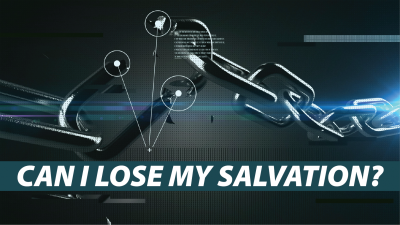
-Shane Idleman
A common question for many is, “Can I lose my salvation?” I’ve heard both sides of the argument, and only God truly knows a person’s heart, but I can share a few thoughts. The reason there is a debate is because the Scriptures teach that salvation is a gift from God that cannot be earned, but they also offer warnings about falling away. There should be a healthy tension between God’s sovereignty and man’s responsibility. This issue should not create a spirit of division, elitism, or theological superiority.
One school of thought suggests that salvation cannot be lost, as in losing your car keys, but that it can be left, as in walking away from it. This may be why Jesus spoke of the man who said in his heart “my master delays His coming; therefore, I will turn from living a godly life”. When the master returned unexpectedly, the servant was banished because he chose to turn from what he knew to be right.
In another passage, Jesus said, “You have left your first love,” when speaking to the church in Ephesus (Revelation 2:4). James 5:19-20 adds, if anyone wanders from the truth and someone turns him back, a soul is saved from death. If anything, these Scriptures, and many more, reinforce the fact that we have certain responsibilities.
1. We must look at the context of such verses. For example, in James 5 the context is a believer who is sick because he or she wandered from God (a pattern of sin) – from alcohol and drugs to lying and slander, and from sexual sin to the sin of pride – the warnings, convictions, and rebukes were all ignored. The elders become involved in hope that confession and repentance take place, and that faith-filled prayer releases the person from God’s chastisement (cf. Hebrews 12:5-7). The believer is heading toward physical death as the result of wandering from God, but if repentance takes place, they will be restored – the soul is saved and his ongoing pattern of sin (multitude) is covered, concealed, and dealt with. This verse is not about salvation, but disobedience.
We should never turn from what we know to be right. Jesus encouraged His followers to be watchful, prepared, and ready for His return. Are we watchful? Are we prepared? Are we ready? (Read Matthew 24:45-51; Luke 21:34.) The Scriptures offer a healthy tension between God’s sovereignty and man’s responsibility.
The other school of thought suggests that some passages are dealing with people who never fully surrendered to Christ. As a result, they fell away. They heard the gospel, but never fully embraced it and turned from their sins; they only had “intellectual” knowledge of salvation. According to this view, the real question isn’t, “Can a person lose their salvation?” but, “Was the person really saved to begin with?”
Titus 1:16 and James 2:14 both conclude that many people “say” that they know God, but deny Him by their lifestyle. I John 2:19 suggests that those who acknowledge Christ initially, but deny Him later, are not saved to begin with: “They went out from us, but they were not of us; for if they had been of us, they would have continued with us.”
2. Who holds us together? If we must maintain our salvation, what happens if Alzheimers or some other mind-debilitating disease sets in and begins to twist, corrupt, and pollute our thinking? Is all lost, or are we held together because we are a child of God? I am convinced, like Paul, “that neither death nor life, neither angels nor demons, neither the present nor the future, nor any powers, neither height nor depth, nor anything else in all creation, will be able to separate us from the love of God that is in Christ Jesus our Lord” (Romans 8:38-39). Nothing can separate us from God, but we should never ignore the strong warnings about turning from Him.
When it comes to salvation, we all agree that God gets all the glory and all the credit. Salvation is His work. We are never outside of His sovereignty and control: “It is God who makes us stand firm in Christ” (2 Corinthians 1:21).
Our salvation is guaranteed based on the assurances found in Scripture, but we also must “work out our own salvation with fear and trembling” (cf. Philippians 2:12). My goal is to be faithful to the command to preach, witness, and proclaim while understanding that God does the drawing, saving, and sealing.
3. At the heart of the division is Calvinism vs. Arminianism. Sadly, brother is shooting brother and sister is wounding sister. Have we forgotten how to show grace to those in the Body who we disagree with? Those who believe you can lose your salvation should not chide those who believe in eternal security – “once saved always saved” is by no means a license to sin – it’s a belief in God’s guarantee. But on the flip side, those who embrace eternal security should not mock those who disagree.
I can hear it now, “But what about Hebrews 6:4-6.” It says, “It is impossible for those who have once been enlightened, who have tasted the heavenly gift, who have shared in the Holy Spirit, who have tasted the goodness of the word of God and the powers of the coming age, if they fall away, to be brought back to repentance, because to their loss they are crucifying the Son of God all over again and subjecting him to public disgrace.”
Based on my understanding of terms such as “enlightened,” “tasted,” and “shared,” they are not necessarily words linked to salvation. Judas Iscariot was enlightened—he knew a great deal. He also tasted and shared in the ministry of Christ, but we all know his fate. When he fell away, repentance was elusive. His fate was sealed. However, this verse should force all Christians to take inventory.
We all sin and fall short, but the important question to ask is what is the condition of your heart—have you truly repented and believed in Christ as your Lord and Savior, or are you trusting in false assurance? This may be why Paul said in 2 Corinthians 13:5, “Examine yourself as to whether you are in the faith. Test yourselves. Do you not know yourselves, that Jesus Christ is in you?”
Our actions reveal a great deal about our relationship with Christ. A.W. Tozer said: “When people find that after being in the church for years they are not making much progress, they ought to examine themselves and wonder whether they have been truly converted.”
Has your heart become so hard as to reject Jesus Christ? If so, you can change that today. I’m aware that I’m driving this point home, but I’d rather err on the side of speaking too much about a committed relationship with Jesus than too little. It’s never too late to get back on track: “Return to me, and I will return to you,” says the Lord (Micah 3:7). God is sovereign but man has a responsibility to repent and return.

